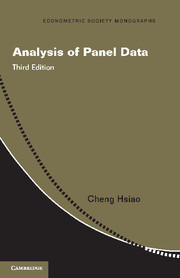Book contents
- Frontmatter
- Dedication
- Contents
- Preface to the Third Edition
- Preface to the Second Edition
- Preface to the First Edition
- 1 Introduction
- 2 Homogeneity Tests for Linear Regression Models (Analysis of Covariance)
- 3 Simple Regression with Variable Intercepts
- 4 Dynamic Models with Variable Intercepts
- 5 Static Simultaneous-Equations Models
- 6 Variable-Coefficient Models
- 7 Discrete Data
- 8 Sample Truncation and Sample Selection
- 9 Cross-Sectionally Dependent Panel Data
- 10 Dynamic System
- 11 Incomplete Panel Data
- 12 Miscellaneous Topics
- 13 A Summary View
- References
- Author Index
- Subject Index
- Miscellaneous Endmatter
13 - A Summary View
Published online by Cambridge University Press: 05 December 2014
- Frontmatter
- Dedication
- Contents
- Preface to the Third Edition
- Preface to the Second Edition
- Preface to the First Edition
- 1 Introduction
- 2 Homogeneity Tests for Linear Regression Models (Analysis of Covariance)
- 3 Simple Regression with Variable Intercepts
- 4 Dynamic Models with Variable Intercepts
- 5 Static Simultaneous-Equations Models
- 6 Variable-Coefficient Models
- 7 Discrete Data
- 8 Sample Truncation and Sample Selection
- 9 Cross-Sectionally Dependent Panel Data
- 10 Dynamic System
- 11 Incomplete Panel Data
- 12 Miscellaneous Topics
- 13 A Summary View
- References
- Author Index
- Subject Index
- Miscellaneous Endmatter
Summary
BENEFITS OF PANEL DATA
As discussed in Chapter 1, panel data provides major benefits for econometric estimation in at least six areas: (1) increasing degrees of freedom and reducing problems of data multicollinarity, (2) constructing more realistic behavioral models and discriminating between competing economic hypotheses, (3) eliminating or reducing estimation bias, (4) obtaining more precise estimates of micro relations and generating more accurate micro predictions, (5) providing information on appropriate level of aggregation, and (6) simplifying cross sections or time series data inferential procedures. In this section we provide a summary view on how different methods discussed in this monograph can be used to achieve these benefits.
Increasing Degrees of Freedom and Lessening the Problem of Multicollinearity
In empirical studies investigators often encounter problems of shortage of degrees of freedom and multicollinearity. That is, the information provided by the sample is not rich enough to meet the requirement of the specified model. To narrow this gap, investigators either often have to impose ad hocprior restrictions (e.g., Hsiao, Mountain, and Ho-Illman 1995) or to augmentsample information. Panel data have many more degrees of freedom than cross-sectional or time series data. Moreover, panel data containing information on both interindividual differences across cross-sectional units and intraindividual dynamics over time can substantially increase the sample information.
Information
- Type
- Chapter
- Information
- Analysis of Panel Data , pp. 464 - 474Publisher: Cambridge University PressPrint publication year: 2014
